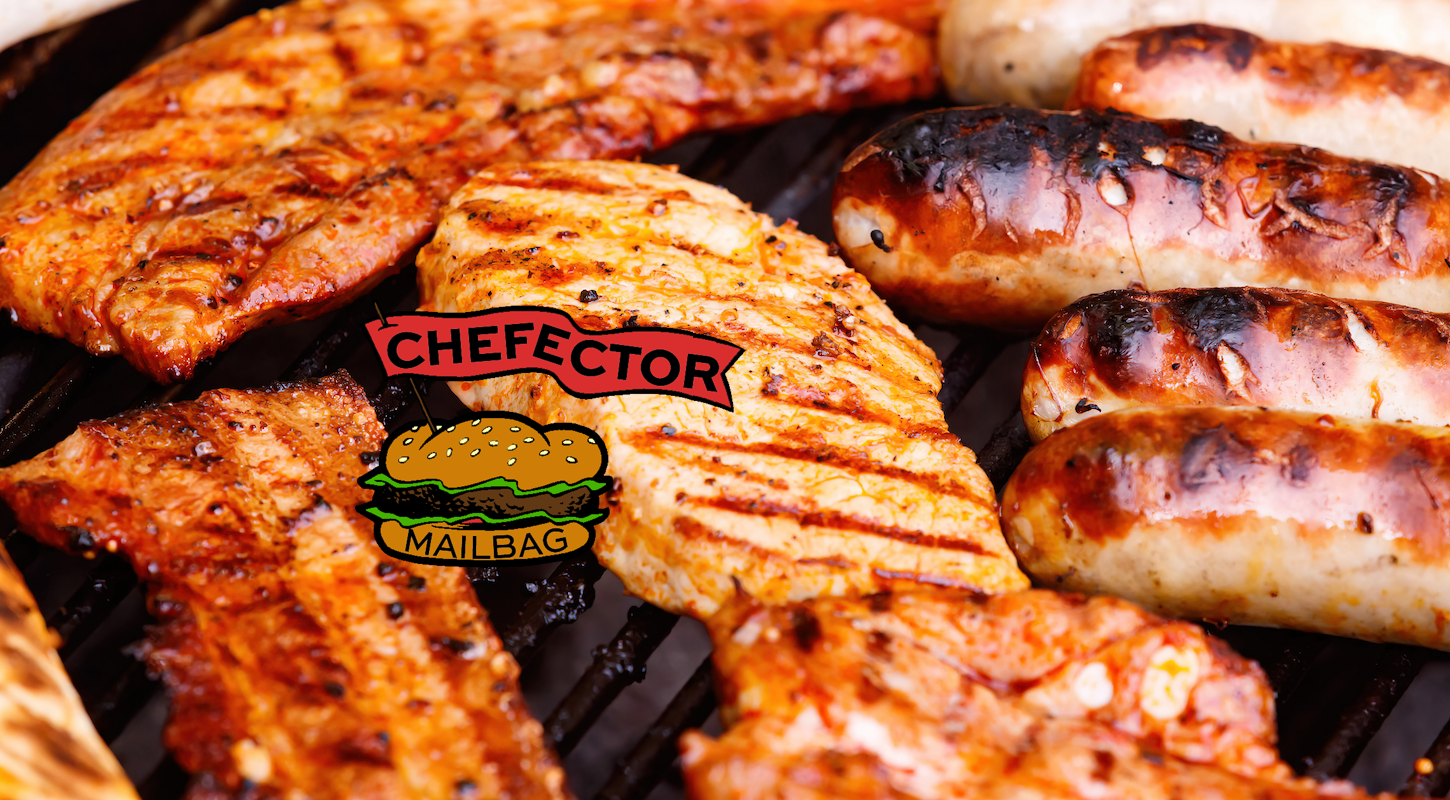Welcome to, uh, I dunno, let's call it Ask A Chefector, the column in which your internet food buddy (me) answers all of your questions about cooking and eating and food and pretty much anything else. Got questions about any of those things? Send me an email.
Michael:
My girlfriend is not very confident in the kitchen, which is fine for now because I am happy to cook for us. However, at some point, we might have kids and I might not be around to cook for everyone all the time (maybe because she poisoned me with her cooking [see below] or for like other reasons I guess).
In particular, she is scared of food-poisoning herself by undercooking meat. Do you have any advice on how to gradually introduce her to the fact that she probably won't die if she tries to cook?
Not everybody wants to cook! Some people just aren't into it, and they don't have to try if they don't want to.
With that out of the way, I should say here that I followed up with Michael and he confirmed that, yes, his girlfriend does want to cook; it's not just that he has some idea that she must get over her aversion and learn to cook. Which, if anything, makes this an even easier problem to solve.
Michael, simply get your girlfriend a reliable and nice instant-read digital thermometer! I myself have a Thermapen One, which I almost never remember to use, and which I promise is not any kind of sponsored product placement or whatever; that's simply what I have in my kitchen. There are other brands and types of good, reliable, easy-to-use instant-read thermometers out there, which you can find at the types of places that sell kitchen shit or grilling shit. Get one of these for your girlfriend, and perhaps print out a chart showing the safe internal temperatures for the various meats. Then she can see for herself that the meat she is cooking has reached what science knows to be the safe temperature at which to eat it.
This does actually get at a larger point I would like to make about cooking. I think a common source of fear or intimidation around cooking, fueled by chef culture and too much food writing, is the sense that it is in essence A Mystic Art: that in order to cook well (or safely) one must possess some supple preternatural connection to mysteries invisible or undetectable to the layperson—the hidden inner state of some wad of meat, for example. But this is false.
There can be artistry to food! In imagining and developing some new combination of flavors or textures, say, or in envisioning a particularly beautiful presentation for the food you cooked, or whatever. And anybody certainly can aim to imbue their cooking with creativity and feeling and personal expression, like an artist. That's a great thing to aspire to.
But also, making friggin' dinner for yourself and your family can also and no less legitimately be a mere household task, a series of steps to follow, with clear goals and outputs, no more mystical or artistic than taking the trash down to the curb. Nobody needs some refined sensibility or sophisticated skill-set to be able to tell whether the trash has, in fact, been taken down to the curb: The trash is down at the curb when it has been taken to the curb, and then not brought back inside. Likewise, the chicken is safe to eat when it has been heated to 165 degrees Fahrenheit. You do not need The Soul Of A Chef to know whether this is the case. You just need a thermometer.
Pedram:
Do you use meat in every meal you prepare or do you have some days where you cook vegetarian meals? As someone who recently went vegetarian for health and planetary motivations, I cannot help but realize just how much I used to cook and eat meat. It would invariably be the center of every dinner I prepared and oftentimes be a part of lunch as well. Now I'm wondering if I just simply ate an inordinate amount of meat or if this is common behavior for Americans in general. Please place yourself on the meat eating spectrum so I have a point of reference for my past meat consumption habits.
Y' know, I'd never really tried to calculate or track this before, which is kind of embarrassing. In any case my ambient sense of how often I cook with meat is "too often." But, hell, I'll take a crack at estimating it.
Probably close to half of the dinners I prepare involve land-animal meat; throw your various frutti di mare into the count, and I'm cooking fauna for dinner on probably two-thirds of days. Most commonly, by a huge margin, the land-animal meat is chicken. I'd guess I cook with beef somewhere between once and twice a month, and pork at a lower frequency, maybe slightly less than once a month on average. The seafoods I use most, chosen primarily for their ease and availability, are shrimp and whatever relatively cheap white fish—flounder, tilapia, trout—looks freshest at the store.
I think I fare better in the day's other meals. I just about never involve meat in breakfast, and in the exceedingly rare instances I do—we're talking, like, a handful of times in a year—it's almost always the previous night's leftovers. Lunches virtually never get meatier than a tin of smoked mussels.
Taken altogether, I guess that's maybe not some extreme amount of meat-eating, relative to other Americans, or perhaps I'm relying on too unkind an estimation of my fellow Americans, whom I tend to assume are just housing Fred Flintstone steaks constantly. I think maybe I allowed the wrong people to calibrate my sense of what the average stranger is like.
Where I disappoint myself (other than in my baseline esteem for other people) is in how automatic and unthinking I allow my cooking and eating choices to get: Whenever I'm not feeling particularly inspired or motivated (this is often), I too easily default to going, "Uh, I dunno, some kind of meat, plus some vegetables." And too often when I don't just default to that, it's because I'm falling back on just the very least nutritionally rewarding starches—that is to say, pasta—without even really considering what I might get up to with all the gazillions of other foodstuffs.
Which is lame! It's lame. I should do better. On the other hand I already know I'm making cacio e pepe for dinner tonight. It's too late in the afternoon for me to plan anything else!
Joe:
When I was a kid I was told to never put a hot pan into a sink full of water to wash it in running water, because the metal would warp, and mom didn't have money to buy new stuff, etc. Was this ever really a thing? Is it still a thing? I tend to wash the cooking dishes relatively quickly after I'm done with them, as long as I won't be burning my fingerprints off, and it doesn't seem to hurt anything. Even just putting them on the granite countertop doesn't seem to harm them, so maybe the technology is better now, or my mom was full of it?
Joe, your mom was right. This admonishment might not apply equally to all pans and pan materials, but I definitely and unmistakably fucked up more than one thin nonstick pan in my younger days by plunging it into a sink full of cold water without first letting it cool at its own pace. My otherwise quite nice shallow-rimmed, squircle-shaped griddle pan that I pretty much only ever used for big dumb diner-style omelets turned convex in the middle, because of my doing this. Which stinks, because now all the egg runs to the edges of the pan instead of congealing in uniform thickness across its surface; now, the part of the omelet that most needs structural integrity—the middle, where fillings might go—is the thinnest and weakest part. A real tragedy.
On the other hand, my clad stainless steel fry pan had been dunked, shriekingly hot, into cold water a bunch of times (before I learned about why not to do this), and it does not seem to have warped at all. I've also run it under cold running water while it's still hot, to quickly deglaze stuck-on gunk, and it hasn't warped from that either. Maybe this is a matter of thickness, or the behavior of different metals, or something? Maybe I could learn this with some minor amount of internet research, if I were not a lazy bag of crap? Alas, who can know the answers to such questions. No one.
In any case, I don't dunk my hot pans into cold water anymore, because I love my pans as I love my arms, and would be devastated if they suddenly were shaped weird.
Edward:
I seem to have a problem cooking meats that tend to smoke up the entire kitchen and house. This has happened with everything from browning a beef roast on the stove to duck in a 500 degree oven (thanks, Ina). How can I continue to cook these without needing to put a box fan in every openable window in my house?
There are things you can do to minimize the amount of smoke your cooking will produce, or how much of it accumulates in your house. You can, for example, use a cooking fat with a high smoke point—canola oil, peanut oil, ghee—and you can use a lot of it, so that it fully covers the kind of particulate stuff that might otherwise smolder in open air. You can use the vent hood over your stove, if you have one, or you can get one if that's plausible for your situation; you can turn it on in advance of smoky cooking so that it has a chance to create an updraft over where the smoky cooking will happen. You can crank open the windows, turn on some fans, that kind of thing. You can cook at pathetic weenie temperatures that merely turn the meat grey instead of really kicking its ass.
What you really can't do is prevent certain cooking procedures—real-deal searing, most especially—from producing smoke. If you're blasting foods, whether meat or vegetable, with many hundreds of degrees of heat, there's gonna be smoke! Maybe not always a Mount St. Helens volume of it, but there will be smoke. Some part of dealing with this might just be getting used to it.
Theo:
I am a man who likes a houseplant. Assuming a small apartment with limited windowsill real estate, which food plants are best? I’m thinking basil and parsley? Any others?
Mint! Indestructible, low-maintenance, thrives in a pot, smells great, happy with frequent harvesting, and useful across a wide range of cuisines. Also you can make delicious mint tea just by, well ... steeping some mint leaves in hot water. The answer is mint. Any kind! I don't give a damn!






